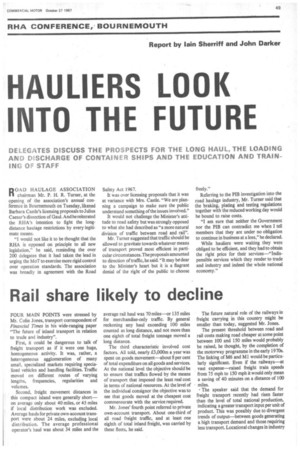HAULIERS LOOK INTO THE FUTURE
Page 51

If you've noticed an error in this article please click here to report it so we can fix it.
DELEGATES DISCUSS THE PROSPECTS FOR THE LONG HAUL, THE LOADING AND D SCHARGE OF CONTAIN r: SHIPS AND THE EDUCATION AND TRAINING OF STAFF ROAD HAULAGE ASSOCIATION chairman Mr. P. H. R. Turner, at the opening of the association's annual conference in Bournemouth on Tuesday, likened Barbara Castle's licensing proposals to Julius Caesar's dissection of Gaul. And he reiterated the RHA's intention to fight the longdistance haulage restrictions by every legitimate means.
"I would not like it to be thought that the RHA is opposed on principle to all new legislation," he said, reminding the over 200 delegates that it had taken the lead in urging the MoT to exercise more rigid control over operation standards. The association was broadly in agreement with the Road Safety Act 1967.
It was over licensing proposals that it was at variance with Mrs. Castle. "We are planning a campaign to make sure the public understand something of the issues involved."
It would not challenge the Minister's attitude to road safety but was strongly opposed to what she had described as "a more natural division of traffic between road and rail".
Mr. Turner suggested that traffic should be allowed to gravitate towards whatever means of transport proved most efficient in particular circumstances. The proposals amounted to direction of traffic, he said. "It may be dear to the Minister's heart but it is a flagrant denial of the right of the public to choose freely."
Referring to the PIB investigation into the road haulage industry, Mr. Turner said that the braking, plating and testing regulations together with the reduced working day would be bound to raise costs.
"I am sure that neither the Government nor the PIB can contradict me when I tell members that they are under no obligation to continue in business at a loss," he declared.
While hauliers were waiting they were obliged to be efficient, and they had to obtain the right price for their services—"Indispensible services which they render to trade and industry and indeed the whole national economy."






















































































































